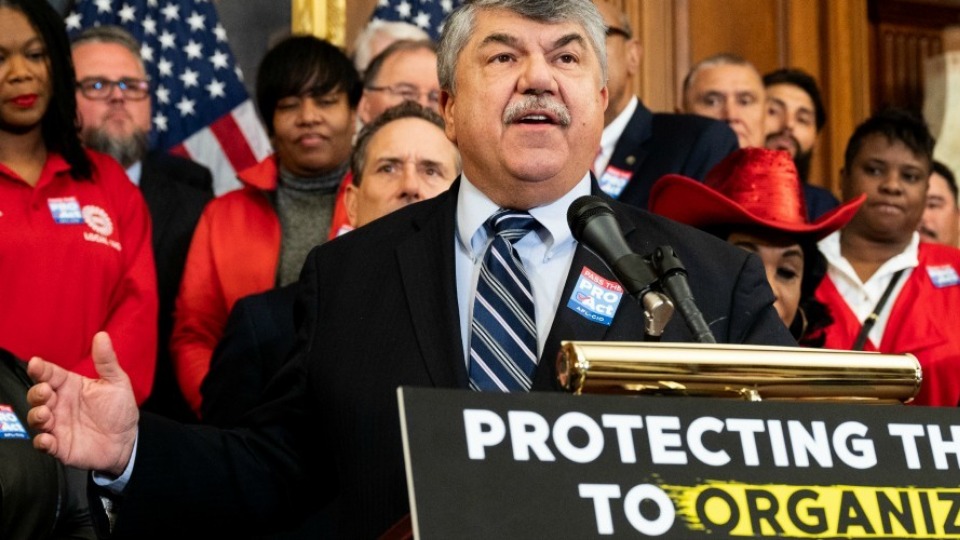
WASHINGTON (PAI)—After another boost from Democratic President Joe Biden, the Democratic-run House passed the Protect the Right to Organize (PRO) Act, the most wide-ranging, pro-worker rewrite of labor law since the original National Labor Relations Act of 1935. Debate lasted into the evening of March 9. The 225-206 vote ended at 8:56 pm EST.
Only five Republicans, notably Rep. Brian Fitzpatrick of Pennsylvania, joined all but one Democrat in backing the PRO Act, officially designated HR842. Biden wants the evenly split Senate to pass it, too. There, 48 Senate Democrats and two independents oppose 50 Republicans.
Winning passage in the Senate will be essentially impossible, unless Democrats in that chamber do away with or evade the filibuster, which allows a minority—the GOP—representing a minority of residents and voters, to hamstring virtually everything that isn’t a tax or spending bill, by requiring 60 votes for it.
“We’re not going to let a minority in the Senate stop” the PRO Act, AFL-CIO President Richard Trumka vowed in a video press conference with lawmakers and the Leadership Conference on Civil and Human Rights just before House debate began.
But he didn’t say how workers and their allies would accomplish that goal, other than to imply the PRO Act’s political foes would face trouble at the polls and, feeling that pressure, perhaps change their minds as to how they’ll vote now.
“If people (lawmakers) know corporations are too strong and workers are not strong enough” economically, “and they make corporations stronger” anyway, by defeating the PRO Act, “they do so at their peril,” Trumka warned.
“And in an era of extreme polarization, nearly two-thirds of Americans—65%—approve of labor unions, so it’s not surprising workers would form unions if they were given the chance. That’s 60 million people knocking on our doors. The PRO Act would let them in.”
Biden’s statement, released before the House debate, didn’t mention the politics. Instead, he talked about economic equity, a theme many of the Democrats took up. Biden reminded lawmakers the PRO Act “would dramatically enhance the power of workers to organize and collectively bargain for better wages, benefits, and working conditions.”
It was his second strong pro-union statement in two weeks. The first was his declaration that a union victory in the recognition vote at the 5,805-worker Amazon warehouse in Bessemer, Ala., is vital not just to the workers but to the country.
“We need to summon a new wave of worker power to create an economy that works for everyone,” Biden said. “We owe it not only to those who have put in a lifetime of work, but to the next generation of workers who have only known an America of rising inequality and shrinking opportunity. All of us deserve to enjoy America’s promise in full—and our nation’s leaders have a responsibility to deliver it,” the president declared.
“That starts with rebuilding unions…. Unions lift up workers, both union and non-union. They are critical,” Biden summed up.
“We are engaged in a great act of patriotism for our country,” House Speaker Nancy Pelosi, D-Calif., said during the later debate.
Reviving workers’ right to join a union
House speeches fell along predictable lines. Democrats laid out the economic and moral case to restore labor law to its National Labor Relations Act roots, as Rep. Andy Levin, D-Mich., a longtime union organizer and former AFL-CIO Deputy Organizing Director, put it.
“I agree we need to restore the balance of 1935,” when the NLRA declared it is federal policy to encourage unionization, Levin told the Republicans, who spent their time trying to destroy the PRO Act by adding weakening amendments.
“What we’re changing is not 1935, but the way it (the law) has been gutted since then by state and federal courts and by” Congress, Levin said. Added Rep. Mark Takano, D-Calif., a Progressive Caucus leader: “It’s time to end illegal power grabs by anti-union interests.”
Some were even tougher. After citing high CEO pay compared to that of median workers, Rep. Jamaal Bowman, D-N.Y., declared: “This inequality cannot stand. This (bill) seeks to empower workers who build our country—and who are being oppressed within this plantation capitalist system.”

Democrats also made the point that strengthening workers’ right to organize, bargain, and reach contracts—without bosses’ blockades, interference, and outright labor law-breaking—would help the economy overall.
“In the late 1970s, a corporate CEO made 30 to 40 times what a worker made,” Rep. Tim Ryan, D-Ohio, practically yelled at the GOP. “Now, they make 300 to 400 times as much, but my colleagues on the other side of the aisle run around with their hair on fire” if lawmakers try to help workers. “But if we passed a tax cut for corporations, they’d be getting in line for it.”
Boost for workers of color
People of color, in particular, would benefit from the PRO Act, several lawmakers of color said. “Unions empower Black and brown people,” said first-year Rep. Mondaire Jones, D-N.Y., a former school principal and member of the School Administrators union. “Anti-union policies most hurt people of color, and they are the most likely to be exploited by greedy corporations.”
“Labor unions throughout history have fought the greed of bosses,” Rep. Ilhan Omar, DFL-Minn., said, citing a strike Marathon Oil forced on 200 workers at its St. Paul Park, Minn., refinery. The strike began Jan. 22.
Rep. Steven Horsford, D-Nev., former head of Unite Here’s Culinary Local 226 training center in Las Vegas, said the PRO Act “will return power to the hands of workers instead of Wall Street.” Unite Here is majority workers of color.
The PRO Act will also undo a big right-wing win in the Supreme Court, the Janus decision several years ago, that made every state and local government worker in the U.S. a potential “free rider,” able to use union services and protections without paying one red cent for them, he added. Workers of color have historically made good, solid, vested careers in state and local government jobs when many other employment opportunities were closed to them.
“Democrats will deliver on this important legislation. But it’s interesting Republicans lately have been trying to falsely rebrand themselves as the ‘party of working people’ while opposing the strongest bill in Congress to give power to workers,” Rep. Mark Pocan, D-Wis., commented. Those same Republicans, he said, “fought tooth and nail to reduce stimulus checks and unemployment insurance” and against raising the minimum wage as part Biden’s $1.9 trillion economic aid legislation.
Rep. Kaiali’i Kahele, D-Hawaii, an Air Line Pilots member, told colleagues he knows “firsthand how unions can level the playing field. Unions give us a stronger voice to advocate for higher wages, better benefits, and for improved workplace conditions. Unions put the power in the hands of the workers. This bill will lift up American workers.”

“What we’re talking about is whether workers are free to come to together and form a union,” Levin told the GOP. “Let’s get back to the basic concept that they’re free to do so—and not have the person who has the most power in the world over them, their boss, interfere.”
Republicans take the bosses’ line on unions
Republicans raised old anti-worker claims, preaching about “union bosses” and “thugs,” “radical legislation,” and called socialism. Unions “make companies less efficient and less competitive,” Rep. Robert Good, R-Va., charged.
Rep. Mariannette Miller-Meeks, R-Iowa, even invoked the old Confederate—and Jim Crow—rallying cry of “states’ rights” in declaring the PRO Act would throw out state “right to work” laws. Levin had noted RTW laws were a Jim Crow-era tactic to split white and Black workers.
And Rep. Denny Walberg, R-Mich., said the “Pro Union Bosses Act” would encourage union leader corruption by destroying accountability. He cited the recent financial scandal involving the Auto Workers, which has seen more than a dozen former leaders plead guilty to taking auto company bribes. Levin shot back that the UAW threw the execs out.
The GOP also uttered outright lies. One was that “fair share” fees gathered from non-union workers whom unions represent go to politics. By law, none of those fees—and no union dues, either—do so.
While GOP ideologues generally denounced workers and unions, Fitzpatrick was the GOP exception. He also was one of many lawmakers who connected supporting “essential” workers—such as grocery workers, sanitation workers, and teachers—battling the coronavirus plague with not just recognizing them, but rewarding them.
“The freedom to organize is a universal value. The pandemic has underscored the need for bringing the PRO Act to the [House] floor,” the Pennsylvania Republican said. “The union card is the single best tool working people can have” to better themselves.
Biden also hit the Democrats’ points in his statement.
“After generations of sweat and sacrifice, fighting hard to earn the wages and benefits that built and sustained the American middle class, unions are under siege. Nearly 60 million Americans would join a union if they get a chance, but too many employers and states prevent them from doing so through anti-union attacks. They know that without unions, they can run the table on workers, union and non-union alike,” the president explained.
“We should all remember the National Labor Relations Act didn’t just say that we shouldn’t hamstring unions or merely tolerate them. It said that we should encourage unions. The PRO Act would take critical steps to help restore this intent.”










